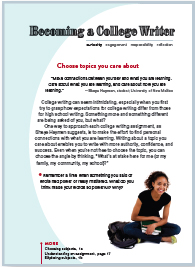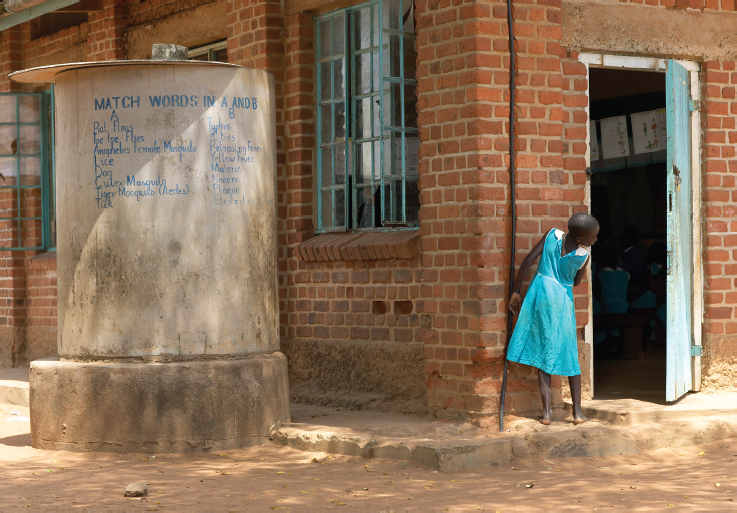Introduction: Becoming a College Writer
Introduction: A letter from the author
“To become a college writer, practice, practice, practice. Just start writing. You will learn from the mistakes you make.”
—Maxime Duijist, student, University of the District of Columbia
“Don’t be afraid to write about something new, something you don’t understand.”
—Amy Fortuna, student, Brigham Young University
Dear Students:
Welcome to The Bedford Handbook—your handbook. Think of it as your guide to writing in college and beyond. Writing well helps you succeed in college courses and prepares you for the world of work. Becoming a confident writer, though, doesn’t happen—for anyone—in a single course or semester. The students who are quoted throughout the handbook, your peers, are learning that it happens over time, in steps and in stages. You’ll find that your confidence as a writer grows as you embrace new expectations—and as you “practice, practice, practice” being a college writer.
College offers many opportunities to write and to learn from the process of writing and revising. As you write, you will read and respond to what others have written, use evidence to support your ideas, and develop your ability to think carefully and creatively—no matter what discipline. In a sociology class, you might be asked to write a field report; in a nursing class, a case study; and in a literature class, a critical analysis. By writing in these disciplines, you contribute your ideas and join thinkers and writers who share interests, ideas, and ways of communicating with one another. The Bedford Handbook is designed to help you make the most of all your college writing experiences and to show you how to write successful college papers.
When college students are asked to reflect on why writing is important to them, many claim that writing helps them learn. One of my former students told me, “Once you write a paper, you begin to see so much more about the subject.” Another student explained, “When you are not writing papers in a course, you take more of a tourist’s view of a subject because you don’t have to think in depth about any of the material.” It is in the process of writing—of working in depth with your own thinking—that you find what’s interesting in a subject and why you care about it. And it is through this process that you learn to figure out not just what you think, but why you think it.
Developing academic habits
Before developing the ninth edition of The Bedford Handbook, I wanted to figure out what the handbook needed and why it needed it. So I surveyed more than one thousand first-year students at thirty-five colleges and universities to learn more about the habits of effective college writers. I asked students how they planned, drafted, and revised their papers and what advice they would offer other writers to help them succeed. The students offered practical, doable advice that came to them through their own trial and error—advice such as “write drafts and ask people to give you feedback” and “the more you can take from a reading, the more you have to give as a writer.” Their responses suggested that developing curiosity, engagement, responsibility, and reflection—in other words, good academic habits—makes good writers. These habits, often called habits of mind, develop over time, take practice and persistence, and require a willingness to learn from both successes and mistakes. This handbook will give you practice in developing these four key habits.
Throughout The Bedford Handbook, you will see several “Becoming a college writer” pages, which offer insights and advice from the college writers surveyed.

Curiosity All good college writing starts with curiosity. What problems or issues intrigue you? What questions need to be explored? How could you solve a problem in a new way? Writing is much more interesting and rewarding when you explore questions you don’t have answers to. Think of college writing not as a process of putting down on paper what you already know but as a way of discovering answers to what you can’t explain.
“Don’t be afraid to ask questions. And make sure the questions you are asking are ones you and your readers care about.”
—Dario Foroutan, student, University of Arizona
BECOMING A CURIOUS WRITER
- Go beyond yes/no questions when deciding what to write about. You may start with a question such as Do SAT scores predict students’ academic success? But you’ll be able to dig a little deeper into your subject if you focus on a particular group of students—multilingual students, for instance—and ask how or why SAT scores predict academic success for this group.
- When you encounter perspectives that are different from yours, be open-minded. Ask classmates how they came to different interpretations about a reading or an idea or why they reached a different conclusion from looking at the same data.
- Read each assignment carefully, and note any questions you have. What is the purpose of the assignment? Is a specific genre expected? And who is the intended audience? Curious writers investigate the details of each assignment.
Engagement Writing is a social activity that brings you into conversations with scholars, instructors, classmates, and peers. Reading actively allows you to engage with other writers. Participating in classroom or online discussions deepens your thinking and gives you opportunities to engage with your instructors and classmates. Seeking feedback from and reaching out to others on campus who might support your learning allows you to engage with a wider learning community. Effective college writers have learned that active approaches to learning work much better than passive ones.
“Find a purpose in your writing assignments. And try to write what you would sincerely be interested in reading.”
—Nicole Zimmer, student, Bristol Community College
BECOMING AN ENGAGED WRITER
- Write multiple drafts to pursue a subject in stages and to make the process manageable. You don’t need to know exactly what you want to say at the outset; you may begin thinking and writing in one direction and then change course as you think and read more about your topic. Along the way, as you draft and revise your work, reach out to readers who can help you shape your work in progress.
- Knock on doors and ask for help with your writing. Make a habit of visiting your instructor during office hours. Use college resources—librarians, tutors, writing center consultants, and advisers—to talk through ideas, test arguments, and clarify your thinking. Good college writers seek feedback and use resources.
- Consider joining a writing group or a study group. Working with a small community of classmates or other students makes learning a productive exchange of ideas (you give something—and then get something in return), reduces stress, and boosts motivation.
Responsibility Engaging with the ideas of other writers and thinkers requires responsibility—to represent their ideas accurately and honestly and to acknowledge their contributions to your work. By giving credit to your sources, you write with integrity, showing yourself as a responsible writer who should be taken seriously. And you show your readers the boundaries between your own ideas and those of your sources, acknowledging contributions to your thinking.
Being responsible also means being accountable to collaborators in team or group projects. Such projects often mirror real-world writing situations, and the practice you get working toward a common goal with peers is valuable.
“Use your sources reliably without warping the original meanings of the words.”
—James Thermitus, student, Miami Dade College
BECOMING A RESPONSIBLE WRITER
- Understand the sources you use. Doing so will allow you to put your sources to work for you. In other words, you figure out what you want to say and then use sources to develop and support your ideas. Being responsible means avoiding patching together sources to let them speak for you.
- Use sources responsibly by developing key habits: Keep track of what you read or view, place quotation marks around words copied from sources, use your own words in paraphrases and summaries, maintain accurate records for all bibliographic information, and never copy and paste Web sources directly into drafts. Use the style (MLA, APA, Chicago) preferred in your discipline or by your instructor to cite sources.
- For group projects, attend all meetings, whether they happen in person or online. Take notes and contribute ideas. When members of the group disagree about how to proceed, try going back to the roots of the project: What is the purpose of the project? What genre are you producing? Who is your target audience? Collaborating on a project can bring stress, for sure, but it also fosters growth and responsibility.
Reflection Reflection involves questioning experiences to learn from them. Being reflective in a writing class often means stopping to think about your own writing habits or approaches to writing tasks. By examining your decisions, successes, and challenges, you’ll be able to figure out what’s working and what’s not, evaluate your writing process, participate in your own learning, and transfer skills from one writing assignment to the next.
“Be passionate about learning to write. The more you learn about who you are as a writer, the easier it is to write successfully.”
—Lorda Laurent, student, Palm Beach State College
BECOMING A REFLECTIVE WRITER
- Track your writing development by keeping a journal or blog. Use your entries to ask questions about your habits and patterns as a writer and to build an awareness of yourself as a writer. For instance, how do you begin each assignment? Or how do you respond to feedback on your drafts? What types of comments help you revise?
- Take time to talk with your instructor after the first or second assignment. Make notes about what you are learning and where you’re struggling. Taking time to examine your habits and approaches can be a valuable learning experience.
- Keep a portfolio, whether or not you’re assigned to do so. A portfolio is simply a collection of your work and often includes drafts as well as final pieces. Taking the time to review previous projects—and especially the comments you received on drafts or final copies—will provide direction for your next writing project and allow you to track your growth as a writer.
Best wishes for a successful year,

As you write: Practicing academic habits
The e-Pages for The Bedford Handbook include writing prompts that will help you apply the handbook’s advice to your own writing. References to the e-Pages occur throughout the book; they look like this:
hackerhandbooks.com/bedhandbook
- The writing process > As you write: Exploring a subject
The following writing prompt, the only one that appears here in the print book, gives you an opportunity to practice academic habits—curiosity, engagement, responsibility, and reflection. Spend time viewing the image on page 8, a photograph by David Sacks. Since the photograph doesn’t speak for itself, you need to examine it closely to discover possible interpretations. Start by listing the details you notice (see 1b).
Be curious What details do you notice? What intrigues you about the image? What does or does not make sense? Brainstorm questions about the photograph. Select the question that seems most promising and write a paragraph response. Use your paragraph to offer a possible interpretation of the photograph.

Be engaged Discuss your questions and interpretation with two classmates. How are their questions and interpretations similar to or different from yours? As you listen to one another’s interpretation of the photograph, ask questions and challenge classmates to explain their interpretations.
Be responsible Summarize the views and interpretations of your classmates. Ask them if you have stated their positions fairly.
Be reflective Reflect on the process. What did you learn from thinking about a photograph with several possible interpretations? What did you learn from listening to your classmates and engaging with their ideas? What was challenging about this exercise?